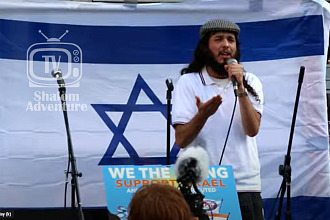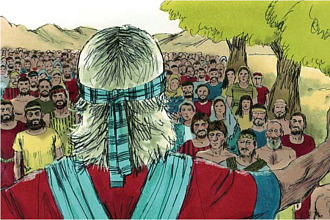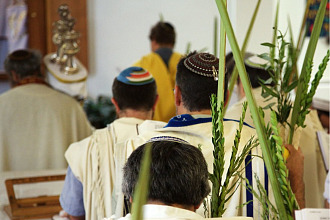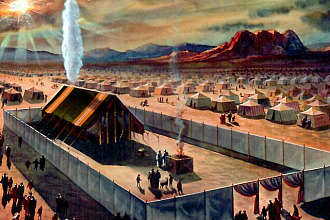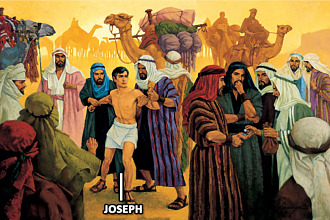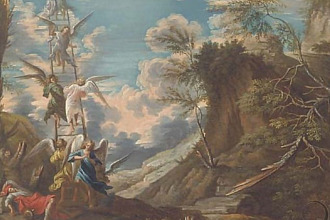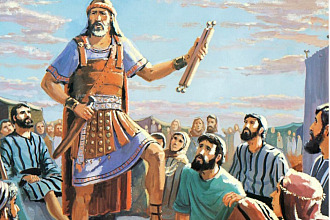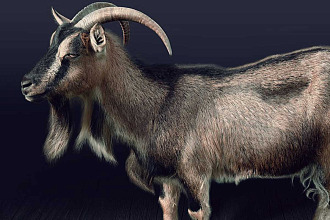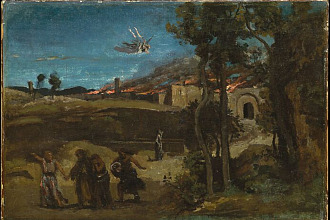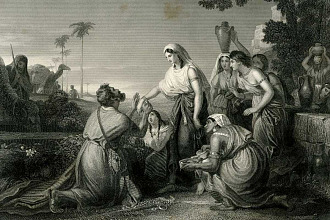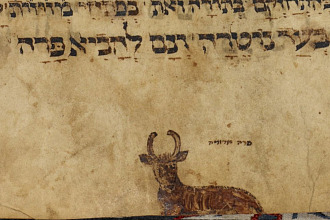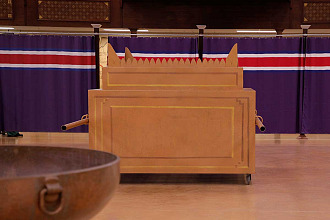Parasha for the Week: Beshalach: Exodus 13:17 – 17:16
Haftarah for the Week: Judges 4:4 – 5:31
Besorat Yeshua: Mark 14:45 - 59
Overview
Pharaoh finally sends Bnei Yisrael out of Egypt. Pillars of cloud and fire, leads them toward Eretz Yisrael on a circuitous route, avoiding the Pelishtim (Philistines). Pharaoh regrets the loss of so many slaves and chases the Jews with his army. The Jews are very afraid as the Egyptians draw close, but G-d protects them.
Moshe raises his staff and G-d splits the sea, enabling the Jews to cross safely. Pharaoh, his heart hardened, commands his army to pursue, whereupon the waters crash down upon the Egyptian army.
Moshe and Miriam lead the men and women, respectively, in a song of thanks. After three days' travel only to find bitter waters at Marah, the people complain. Moshe miraculously produces potable water. In Marah they receive certain mitzvot. The people complain that they ate better food in Egypt. G-d sends quail for meat and provides manna, a miraculous bread that falls from the sky every day except Shabbat. On Friday a double portion descends to supply the Shabbat needs. No one is able to obtain more than his daily portion, but manna collected on Friday suffices for two days so the Jews can rest on Shabbat. Some manna is set aside as a memorial for future generations. When the Jews again complain about a lack of water, Moshe miraculously produces water from a rock. Then Amalek attacks. Joshua leads the Jews in battle while Moshe prays for their welfare.
"Shabbat Shirah"
This Shabbat is called Shabbat Shirah (Shabbat of Song). because in Parashat Beshallach, we read about the splitting of the Red Sea and the Shir, (the song) Moshe and the people of Israel sang praising G-d for the great miracle which they just witnessed.
"On the Way"
After describing the redemption of Israel from slavery and the feast celebrating this freedom, Pesach, the Scripture starts the narrative of the people of Israel in the wilderness. They are at the beginning of their path to the fulfillment of their destiny as G-d’s people.
They were still weak, not knowing how G-d can release them forever from the ambition and power of Pharaoh. They still lack of trust in G-d, the only quality that can give a person determination and courage, power and enthusiasm, no matter what the task and under any circumstances, since he knows that all in His hands, but they are trusting G-d's instrument, Moses.
"A G-d Who Sustains"
The Torah continues: “G-d did not lead them by way of the land of the Philistines, although that was near.” (Exodus 13:17) As Rabbi Hirsch put it, the Children of Israel were not yet ready for such a way of life. Only extraordinary experiences would educate them to the awareness that G-d’s providence not only saves His children from destruction, but also sustains them, day by day, in all conditions and in all situations. This was the purpose of Israel’s wanderings through the wilderness: this was the meaning of the detour that G-d now made them take.
"Yosef's Bones"
The people of Israel kept their promise to Yosef: “Moses also took the bones of Yosef with him, for he had made Bnei-Yisrael swear an oath saying, “God will surely remember you, and then you are to carry my bones away with you.” (Exodus 13:19). What a contrast! On one hand there are Six hundred thousand armed men on their way to the Promised Land, maybe with not enough confidence in G-d and on the other hand, there is Yosef, the one who trust in the fulfillment of G-d’s promise, even if it is to come after his death: “I am about to die, but G-d will visit you and bring you up out of this land to the land that he swore to Abraham, to Isaac, and to Jacob” (Genesis 50:24).
According to the Jewish tradition it was not an easy task to find Joseph’s body. Moses knew that he had been buried in the mausoleum of the Egyptian kings, but there were so many other bodies there that it was impossible to identify it. It was only by a miracle that his bones were identified.
Haftarah: Judges 4:4 – 5:31
We have a very negative view of the people of Israel in the time of the Judges, but reading this book it is “essential to remember that combined years of peace and faithfulness far outnumbered the years of failure. Always, the Judge was chosen by God, and whenever he or she called upon the people to repent, they responded.”
The text of the Haftarah is about Deborah, name which means “bee.” “At that time Deborah, a prophetess, wife of Lappidoth, was judging Israel..” (Judges. 4:4). There is a question here about the translation of this verse, If Radak translates the expression as it is here “wife of Lappidoth” saying that “Lappidoth was in fact Barak, the army commander, Barak and Lappidoth mean "flashes of lightning," and are therefore used interchangeably” (Rubin commentary, 137). However, some other Jewish commentators as Ralbag and Metzudoth, do not translate that she was the “wife of Lappidoth” but a “fiery woman” saying that the word Lapid means “torch” implying that Deborah was energetic and decisive. Rashi, based on the Midrash, translates “a woman who made wicks for use in the Tabernacle”
The name Barak means “thunderbolt”, which suggest that he is summoned by the Lord’s “flashing sword.” And it is interesting to notice that his name is among the heroes of faith in Hebrews 11:32.
Deborah was the first Judge to be described as a prophetess and the first of whom it is said that she decided cases of law for the nation. She was chosen at a special time to lead and end war with the Canaanites and their domination. There was another prophetess before Deborah, Myriam, but she was not Judge in Israel.
Another parallel between Myriam and Deborah is the songs they sang: “Sing to the Hashem, for he has triumphed gloriously; horse and rider he has thrown into the sea.” (Exodus 15:21). God uses men and women to reveal his will to humanity. When God choose women for ministries, who are we to refuse these choices?
Exactly as Miriam was a great support for Moses, Deborah supported Barak, who could be according some commentators her husband and in the same time the chef of Israel’s army: “Then Deborah said to Barak, “Arise! For this is the day in which Hashem will deliver Sisera into your hand. Has Hashem not gone out before you?” So Barak came down from Mount Tabor with 10,000 men following him. Hashem threw Sisera and all his chariots and all his army into confusion before Barak with the edge of the sword. Then Sisera got down from his chariot and fled away on foot.” (Judges 4:14–15). Let’s remember that the people of Israel were not very well organized, Israel remained incapable of united action until a woman (Deborah) summoned them to the Lord’s battle, Israel had no standing army at that time. The fighters were all non-professional volunteers. These volunteers were not full of courage to rise up and face the enemy, the glory of victory went to a woman (Jael).
The chapter 5 is a song sung by Deborah who was also a poetess. Webb affirms “The Hebrew used in this song shows it to be on of the most ancient pieces of poetry” in the Tanach.
APOSTOLIC WRITINGS: Mark 14:45 - 59
In n parasha Beshallach we are still in a situation of conflict, the people of Israel who crossed the Rea Sea are completely delivered from Pharaoh. As long as they were on the Egyptian side of the sea, they were in danger. In the same way the Besorah of Mark describes a situation of conflict between Yeshua and the Scribes and the Temple’s leaders. It is clear that the garden of Gethsemane was, that night, so full of pilgrims, camping, sleeping, and waiting for the great day of the feast that without Judas’ help the kohanim would never have been able to find Yeshua among the people and in the darkness.
Yeshua did not come as a temporal prince or king, but as a preacher of repentance and reformation, and yet was crucified, that is why the last chapters of the Besorah are painful. It is the last night before the crucifixion, Yeshua is identified by the kiss of Judas (45). Kissing on the cheek was part of the local culture— still today this is part of the Mediterranean culture, it is very common in Italy, France, Spain and other countries that men great each other by kissing on the cheek.
Yeshua is arrested: “Then they laid hands on him and arrested him.” (Mark 14:46). The disciples want to defend him: “But one of those who stood near drew his sword and struck the servant of the Cohen Gadol, cutting off his ear” (Mark 14:47). But Yeshua stops the disciples, it is not time to fight for. He did not come to take the sword and to fight the Roman armies to deliver Jerusalem from their occupation. He knows that he has to drink the cup, that means to accept what the father has prepared for him, what the prophecies said, and to accept his destiny. The calmness of his answer amazed everyone: “Have you come out with swords and clubs to arrest me as though I were a bandit? Day after day I was with you in the temple teaching, and you did not arrest me. But let the scriptures be fulfilled.” (Mark 14:48-49).
In the parasha also it was not time to fight the army of Pharaoh, God did not want Israel to fight against Pharaoh. God wanted to demonstrate to Israel, that victory over human armies can come through miracles. Thus the Red Sea opened miraculously to let the Israelites cross through it on a dry ground,
In the Besorah of Mark, the disciples were really disappointed, they were sure that Yeshua was the Mashiach, the one who would deliver Jerusalem from the Roman armies. They did not expect the death of their Messiah. They did not understand what was happening and all of them left him: “All of them deserted him and fled.” (Mark 14:50). If the kohanim and the soldiers could have arrested Yeshua’s followers as well as Yeshua, they would have done it, but all of them run away. That is why Peter, later, feared being recognized in the Kohen Gadol’s house and denied being a follower of Yeshua.
Then we have two verses about a young man: “A certain young man was following Him, with nothing but a linen cloth around his body, and they grabbed him. But he ran away naked, leaving behind the linen cloth.” (Mark 14:51–52). There is many discussions among the scholars as to who the young man of this story is, some have suggested that it is John-Mark, the writer of this Besorah, in whose home the Seder of Passover may have taken place,— the followers of Yeshua were used to meet in his mother’s house in Jerusalem (Acts 12:12).
It is very strange to see how the Temple leaders were against Yeshua. Of course in one way they were afraid of what he could do to the temple and their own business. Some witnesses said: “We heard him say, ‘I will destroy this temple that is made with hands, and in three days I will build another, not made with hands.’” (Mark 14:58). If the Temple would be destroyed, these people who were the Sadducees, and who were legitimate only through the temple would disappear. And it is what happened, forty years later, when the temple was destroyed by the Roman Empire, the Sadducees disappeared and the Pharisees became the leaders of Israel. Their fears became a reality four decades after taking responsibility on releasing yeshua to the Romans authorities.
The corruption of the Kohanim of the first century is well known among the Jews, the Kohen Gadol was not anymore legitimate as a descendant of Aaron but was buying his charge from the Roman authorities. The innocence of yeshua is a fact, the Cohen Gadol could not prove that he was guilty, they looked for witnesses, they did not find any, and then they provided false witnesses: “Now the ruling kohanim and all the Sanhedrin kept trying to get evidence against Yeshua so they could put Him to death, but they weren’t finding any. Many were giving false testimony against Him, but their testimony wasn’t consistent. Some stood up and began to give false testimony against Him, saying, “We heard Him say, ‘I will destroy this Temple made with hands, and in three days I will build another made without hands.’ ” Yet even then, their testimony didn’t agree.” (Mark 14:55–59). These verses and the following describe Yeshua before the Sanhedrin (supreme court), but the “focus moved to the search for any and every evidence, false or true, sufficient to condemn Yeshua to death.” False witnesses are still easy to buy today, in many parts of the world. The trial of Yeshua was not fair, the officials had already decided on the verdict in advance but lies are harder to prove than the truth (56). Even though the Sanhedrin met in the middle of the night, according to the Jewish law, the full Sanhedrin could not meet legally before the daybreak, that is why the chapter 15 states: “Right at daybreak, the ruling kohanim held a meeting to consult with the elders and Torah scholars and the whole Sanhedrin” (Mark 15:1). That means the trial during the night before the Sanhedrin was illegal.





